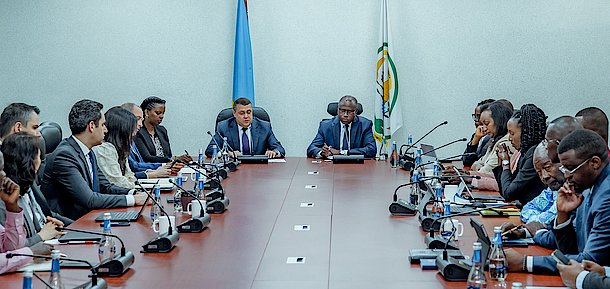
Rwanda is set to gain access to approximately US$76.6 million through the Resilience and Sustainability Facility (RSF) and US$88.9 million through the Standby Credit Facility (SCF). This comes after a successful conclusion of a staff-level agreement between Government officials and the International Monetary Fund (IMF) mission team on economic and financial policies necessary to complete the third review under both the Policy Coordination Instrument (PCI) and RSF arrangement. Additionally, the mission conducted the first review of the SCF arrangement. However, this agreement is subject to approval by the IMF Management and Executive Board, tentatively scheduled for May 2024.
In a statement released today, the IMF mission team noted that performance under the PCI, RSF, and SCF programs has been robust, with all reform targets and measures outlined for the reviews progressing well and expected to be completed ahead of the Executive Board discussion.
At the conclusion of the Mission, Mr. Ruben Atoyan, the IMF Mission lead, stated, “Despite a challenging environment, macroeconomic policy performance through end-December 2023 remained in line with program objectives under the PCI/SCF arrangement. The mission appreciates the authorities’ excellent cooperation and candid, constructive discussions and reaffirms the IMF’s support for the government’s efforts to implement its economic reform program.”
Dr. Uzziel Ndagijimana, the Minister of Finance and Economic Planning, remarked, “Rwanda’s economy has rebounded strongly despite external shocks and climate-related setbacks. I thank the IMF for continued support through the PCI, RSF, and SCF arrangements. We will continue to collaborate closely with the IMF to ensure prudent management of our economy.”
After two weeks of discussions with various government officials, the IMF mission highlighted Rwanda’s strong economic growth in 2023, supported by services and construction, as well as a recovery in food crop production in the latter half of the year. Inflation has decelerated significantly in recent months.
The mission pointed out that while Rwanda’s economic outlook remains positive, there are risks tilted to the downside. Factors such as deepening geopolitical fragmentation, another spike in global energy and food prices, or a slowdown in trading partners’ growth could impact the outlook. Longer-than-expected tight global financial conditions could also affect the availability of external financing.
Regarding climate change, the team acknowledged the government’s ongoing progress in strengthening institutional capacity to integrate climate-related considerations into the design of macroeconomic policies and frameworks. Maintaining the strong reform momentum under the RSF will help bolster the economy’s resilience to future climate shocks, while also positioning Rwanda as a leader in the region on climate initiatives. (End)
